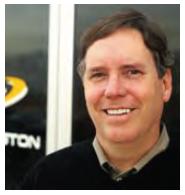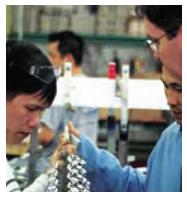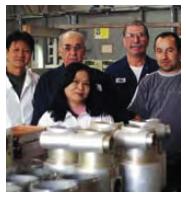By Josh Grossmann
Todays’ Machining World March 2007 Volume 3 Issue 3

Pilkington Metal Finishing employs 110 workers and does upwards of $5 million a year in aluminum anodizing work out of a 72,000 square foot building five minutes from the Salt Lake City airport.
From his desktop computer, with the help of specially designed software, company founder and president Van Pilkington can monitor and track in real time, the jobs in progress of each of his production workers.
But it wasn’t always so. The business, he recalls only too well, began a quarter century ago about as modestly as an enterprise possible can: in a cinder block garage that her ented for $145 a month. With nobody but himself on the payroll, Pilkington loaded jobs into the back of the family pickup after his afternoon classes at the University of Utah, did them himself on the little tank line that he and his father had set up in the garage, delivered them a day or two later, then scurried home to type up invoices.
His father, who’d retired from the Air Force and worked for a Fortune 500 company that supplied chemical and process equipment to the metal finishing industry, had helped with $4,500 in seed money – and more importantly, suggested an eager account – a medical devices company that needed many of its expensive parts refurbished. “This is something we don’t want to do in-house,” the company’s purchase agent told Pilkington. “It’s a good opportunity for an enterprising young man like yourself.”
Then in his early twenties, a year short of graduating with a degree in organizational communications, married, and already a father, Pilkington knew absolutely nothing about metal finishing. But he knew plenty about himself. Thanks to a uniquely challenging and rewarding two-year experience, he’d already braved the unknown and successfully tested his mettle. Pilkington had every reason to believe he could rise to this challenge too.

On a Mission
Like many young Mormons, he’d volunteered for missionary service at age 19. Two years later he returned from his mission in the Netherlands changed in many ways. This volunteer service, familiar to most Americans as a duo of well-groomed young men standing at the front door in white shirts and dark pants, has a clear function: spreading the message of The Church of Jesus Christ of Latter-day Saints and bringing new members into the fold. But for most of the 50,000 or so who volunteer each year (a small fraction are women; their postings last 18 months and don’t start until age 21), this stint away from home, potentially anywhere in the world, affords an extraordinary time of personal growth. An entrepreneurial spirit and budding business acumen are not intended outcomes of LDS missionary service, but they are the collateral benefits for many who serve.
It’s not by accident that the first chapter of a new book, The Mormon Way of Doing Business (Warner Books, 2007), is titled “On a Mission.” The book’s author, Jeff Benedict explains:
“The missionary experience in the Mormon Church comes in the formative years of a young man. At age 19, most American boys are headed to college, to jobs, to the military; they’re exploring alcohol and women. In the Mormon Church, young men are sent all over the world, and for two years they are intensely focused on a disciplined lifestyle that prohibits dating, entertainment, work or employment, and demands a disciplined focus on service, without compensation. You are an ambassador for The Church of Jesus Christ of Latter-day Saints, and the experience of literally wearing a badge on your chest each day with your name on it and the church’s name under your name instills in you a sense of responsibility and obligation that is very foreign to most 19-year old adolescents.”
Benedict, whose own Mormon missionary experience sent him across the continent, from Connecticut to Seattle, Washington, continues: “Conventional wisdom would say that when these guys come home at age 21, they’d be behind in schooling and work experience, but in fact, in two years they have gained an enormous competitive advantage, especially if they are going to become entrepreneurs, businessmen or any sort of professional, because they obtain a set of experiences and skills that cannot be replicated in any institution of higher learning or business school. Skills like planning, discipline, drive, commitment, perseverance.
“If you don’t have perseverance, you’re not going to be an entrepreneur, because entrepreneurship is all about overcoming failure and hurdles and sticking to dreams and imagination – seeing it through. And a mission is two years of obstacles, hurdles and overcoming rejection. Selling religion is the hardest sell job in America. If you can do that for two years and come away with a smile on your face and your chin up, you can do just about anything. That, and the fact that you learn how to relate to people on a mission, because whether you go to the slums of Brazil or the streets of London or to China, you are going to understand people and what it means to be on their level.”
The top executives featured in Benedict’s book hail from big business [see box] and major institutions like the Harvard Business School. But what might be called the Mormon missionary advantage, as we’ll see in the case of Van Pilkington and two other Utah-based entrepreneurs,
also benefits small businessmen.

Can Do Spirit
Pilkington began developing an entrepreneur’s essential “can do” spirit in “must do” circumstances the moment he landed in the Netherlands. He’d just completed the customary two-month’s mission training and language tutoring (preparing the way for leading LDS lesson sessions in the destination country). But upon entering the Amsterdam airport terminal he froze: “This can’t be the language I’ve been studying.”
Of course it was – and his challenges and lessons had only begun. One of the first things he learned was how effectively his mission organization kept all 180 missionaries on task. Heading the organization was a president who traveled with two assistants, missionaries nearing the end of their tour of duty who served as “life mentors” to newer arrivals. Zone leaders oversaw the training and teaching and monitoring of roughly three-dozen missionaries. Beneath them, district leaders were charged with five or so missionaries. Each newly arrived missionary, or “greenie,” was assigned to an experienced companion. As tours ended and new arrivals came, assignments changed and the better performers stepped up to become district and zone leaders.
“The mission organization was very effective atcommunicating messages, at keeping us informed. We knew what our tasks were and exactly what was expected of us,” says Pilkington, explaining the daily regimen began at5:30 a.m. with individual prayer and scripture study, then study with your companion. “We were out the door by 9 a.m. and home by 9:30 at night, when we reported to the mission president. By 10 o’clock the mission president knew where all his missionaries were.
“It’s quite powerful to be in a group that acts in accordance with a set of principles that they have chosen to align themselves with. Then you police yourselves as a group to see how well you’re holding to those sets of promises you’ve made – that’s where the growth comes from and the power of missionary work comes from,” he continues, explaining that years later, when his business started to grow and his workforce swelled, he decided to build his company from a similar mold. This has proved essential, as, over time, his workforce has taken on a United Nations cast, relying heavily on recent arrivals from Vietnam, Laos, Chile, Argentina and Iraq. Stitching this quilt of many nations together, he explains, is “an underlying degree of respect” that starts at the top, with management.
“Borrowing a bit from the Boy Scouts and my church background, we’ve created a quality statement and an employee policy statement that emphasizes integrity, honesty and respect, and the importance of keeping commitments,” he continues. “It can be in their native language, but I make everyone memorize them. And when we get together we rehearse them.”
Drawing From the Well
Sitting as he does, atop an organizational structure that bears a strong resemblance to the districts and zones of his missionary experience, Pilkington leads in the manner of his Dutch mission president – down to knowing, via his special computer software, the equivalent of where all of his charges are at the end of the day.

He explains that his missionary experience, though decades in the past, is such a part of who he is, that even today it provides a well of experience that he can draw from for guidance whenever a problem arises, invariably asking himself, “How would I have dealt with a situation like this as a young missionary?” Running a successful business, Pilkington has learned, “involves processes – and processes can be improved. You can get better. That is really fundamental to a Christian ethic – the belief that you can improve and change and get better.”
Eric Forsberg, who could not be happier with his career change from technical writing to manufacturing parts for Jeep enthusiasts, credits his Mormon missionary experience not just for empowering such an entrepreneurial leap of faith but also for the ever growing success of his Logan, Utah, based company, Novak Conversions. With his father Dewey, an aerospace industry machinist, Eric Forsberg, Novak’s vice president, bought the company in 1999 after the death of its founder, Lloyd Novak. The much-loved Novak had long served Jeep aficionados by manufacturing transfer case adapters and other specialty parts to enable performance enhancing conversions as transmission and engine replacements. Forsberg, owner of a ’69 CJ-5, had been one such loyal customer, someone, he admits, “who could never get my mind off Jeeps.” When he learned on a message board that Novak had died and that the business was faltering, Forsberg decided to forsake a career he enjoyed but wasn’t passionate about, for something that did light his fire.
“I learned to listen to and follow my heart on my missionary experience,” he says, explaining that his experience in Switzerland and France from 1991 to 1993, which pushed him “to the limit” and taught him how versatile he could be, also gave him the confidence to pursue his hobby as a business. Since acquiring Novak’s good name and client list and a small inventory of 85 different parts, the Forsbergs have grown company revenue five-fold and now manufacture more than 400 parts.
Novak Conversions sells worldwide to a wide array of customers – and does so more effectively, Forsberg believes, because of his time overseas as a Mormon missionary. “We have a lot of customers and suppliers whose cultures span the spectrum. We have interactions with PhD types and many individuals who maybe didn’t finish high school and then everyone in between.
“I learned in Switzerland,” he continues, “that when I discussed religion and beliefs that it was best to find the common thread and then build from there. I think this translates well into business – machining, Jeeps, or anything else. The more kinds of individuals our people can comfortably sell to, source from, or partner with, the better chance we have of running a healthy company.”
Problem Solving Skills
Brad Simons, founder of Cottage Homes, a construction company in Draper, Utah, also believes that he learned many of the necessary skills and attributes of an entrepreneur on his Mormon mission – which forced him to mature and adapt under especially challenging circumstances. Arriving in Bahia Blanca, Argentina in 1981, to a country ruled by a military dictatorship, the first thing he saw was the barrel of an M60 machine gun pointed at the door of his plane – a gun in the hands of someone who looked no older than 12. “I live in the West and I hunt. I’ve shot guns all my life,” Simons says, “but I wondered, ‘What the heck have I gotten myself into?’”
Every day was an exercise in problem solving. Simons spoke very little Spanish, his missionary companion spoke no English, yet they had to communicate and work together. When the Falklands War hit the country later in his stay and wartime rules made it impossible to knock on doors, Simons had to adapt.
Far from his mission president, who in those days was reachable only by telegram, he learned to take initiative. By then in a leadership role, Simons rode buses to neighboring towns and held training sessions for Mormon elders and visited with their local members. “You’re six hours away from your leadership and you’re making decisions. You get used to it. And I think that’s what an entrepreneurial spirit is: You have to make your own decisions, want to jump out there and be in charge.”
His missionary service provided indelible lessons in interpersonal relations that now aid him in running a company that built 40 homes in 2006 and expects to build twice that many this year. “When you’re sitting on a dirt floor teaching someone a gospel lesson, there’s no heat and you’re cold, you have to love that person for who they are. That gives you a tremendous amount of empathy,” he says, citing a necessary entrepreneurial skill for “rallying human resources and creating a team that can excel.”
Simons’ two year stint in Argentina also taught him something else that he finds crucial to his success in the homebuilding industry, initially with a small company he helped expand to a national power, and now with Cottage Homes, which he co-runs with his brother Kyle. The Mormon missionary experience, he explains, is a very single-minded pursuit. “You don’t worry about money. You’re celibate, so you don’t focus on girls. You’re not thinking about your college education. You’re able to focus 100 percent on the missionary work.” Simons points to that bred in the bones ability to focus as just as important to running a business. “I’m in the process of starting an insurance business with some friends of mine. We’re trying to do it while running our other businesses.” His solution? “I have to turn off the world – turn off the phones, the pagers. Technology is great, but it has complicated our personal lives. I need a half-day to think, so I’ll often go home, rather than stay at the office. I’ll turn off my cell phone. The house will be quiet, and then I can really focus on the task at hand.”
Simons, who serves on the National Association of Home Builders, often running training sessions, has found that the trade organization’s three weeklong meetings each year offer him additional opportunities for this kind of intense, uninterrupted focus. When others hit a host city’s nightspots after dinner, Simons generally retreats to his hotel room. The TV stays dark as he drafts business plans or contracts, or addresses nagging business issues.
“On your mission you’re really taught to study, as much as two hours a day, and the only one thing you’re studying is the gospel,” he says, explaining that having learned that discipline in adolescence, he now finds it easy to work well past midnight, and does some of his most creative and analytical work in such sessions. The only trouble, he acknowledges, is the bated breath back in the office that greets his return from such trips. Everybody’s wondering: “What’s he going to have us change now?”
Mission Possible:
JetBlue’s David Neeleman comments on his mission experience.
Someone who had always struggled in school, Neeleman didn’t yet know that he suffered from the now much more widely recognized learning disability known as Attention Deficit Disorder. “I had always thought I was kind of stupid or slow. I got down there to Brazil and I was on a regimented schedule – morning study and things I had to do, the devotion aspect of being totally committed to a cause, and I really excelled in that disciplined environment,” he says. “For the first time in my life I felt like I could succeed. I got to a leadership position and was helping run the mission. When I came home after two years I felt completely different about myself and my prospects, my confidence level, and how I felt about people, more compassionate.”
An egalitarian CEO who spurns such typical corner office perks as car services, Neeleman is known for occasionally joining his flight attendants greeting and serving JetBlue passengers en route. “Missionary service is all about service – 100 percent giving of yourself, “ he says. “Leadership is all about service. There is dictatorial leadership and then there’s servant leadership. If you’re a servant leader, people want to follow you a lot more than if you’re a dictator. Everything I know about service I learned on my mission.”
From The Mormon Way of Doing Business by Jeff Benedict.

1 Comment
The point of having mission experience is a good point. Learning responsibility, advancing ones beliefs, and just learning and practicing these things in an honorable way is commendable and good. That being said there is some seriously sad news that goes with this.
They are young people who have been fed lies and are on a mission to spread the lie / lies of Mormonism. They really have no idea what the gospel of Jesus Christ, as taught in the Bible, is all about. The use of the Book of Mormon means that they use a book that has fictional people, places and events in it. It is a book of fiction. The Bible that Christians use is composed of real people, places, and events that have been verified many times and in many different ways. The doctrines taught in the Christian Bible and those taught by Mormonism are radically different. As concerned adults we need to tell our young people and their elders the truth. It is a fact that no matter how you dress up a lie it is a lie, error is error, false teaching is false teaching, no lie is of the truth.